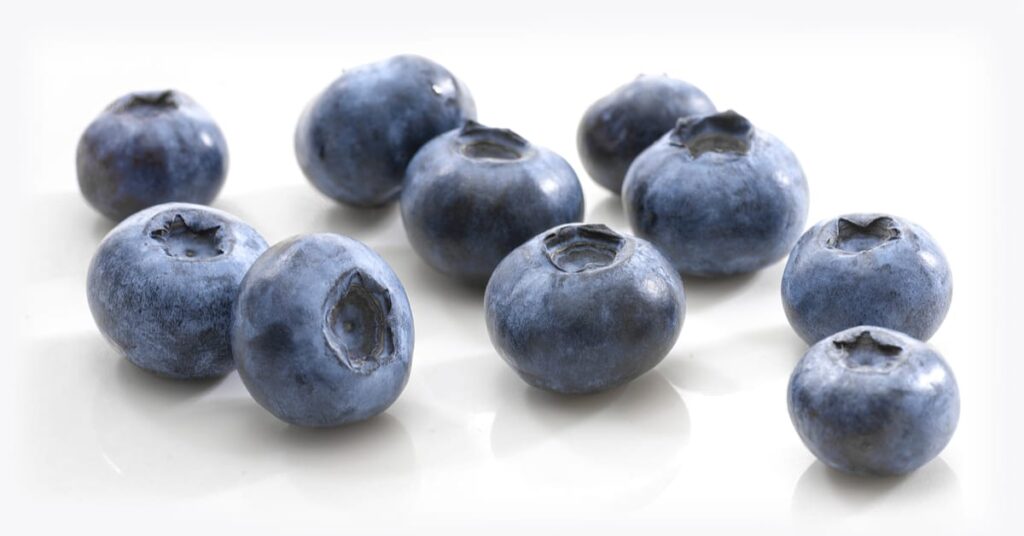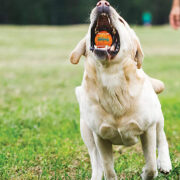Blueberries are great for humans. They are nature’s delicious and sweet superfood and provide antioxidants, Vitamin C, and other health benefits. Though you enjoy blueberries and know they can contribute to your overall wellbeing, is it ok if your dog eats blueberries as well? If so, how should you feed blueberries to your pup? Are there any precautionary measures you should take when it comes to this healthy treat?
By learning more about if blueberries are safe for dogs, you can potentially incorporate this fruit into your pup’s diet.
Can Dogs Eat Blueberries?

Yes, dogs can eat blueberries. Are blueberries good for dogs? Absolutely.
Fresh blueberries or frozen blueberries are a healthy alternative to a regular dog treat and provide a number of health benefits.
The Health Benefits of Blueberries for Dogs

Blueberries, a low-calorie food, contain anthocyanins, which is a type of antioxidant that will combat unstable atoms that wreck cells and make your dog age faster. Additionally, if your senior dog eats lots of foods with antioxidants like blueberries, it can lessen the effects of cognitive decline.
Another health benefit of blueberries is that they contain fiber, which feeds the good bacteria in your pooch’s immune system and ensures that it stays healthy.
Blueberries are full of vitamins A, C, and K, calcium, magnesium, potassium, and manganese, which are also good for your pup and can work to increase his energy levels.
Safety Tips for Blueberries
Smaller dogs may not be able to tolerate blueberries as well as larger dog breeds. This is because the high fiber levels could hurt their digestive tract.
Blueberries may also be a choking hazard for smaller dogs, so if you serve them to your puppy or small breed dog, mash or chop them up for safety purposes.
Blueberries contain sugar, of course, so keep that in mind if you’re trying to keep your dog off of sugar.
Feeding Your Dog Blueberries

Since the sugar content of blueberries is moderate, you shouldn’t let your dog have tons of them at a time. Instead, you should give your dog blueberries as a treat as opposed to a meal.
Dog owners can also use blueberries as a healthy snack if they don’t want to feed their pups normal dog treats, which may not be as healthy. They also make a great snack and good occasional treat if your dog is suffering from obesity since they are low in calories.
Before feeding blueberries to your dog, thoroughly wash them off. They could be covered in pesticides, which are harmful to your pup. If your dog ingests pesticides, he could get an upset stomach or experience other health problems.
After washing the blueberries, you can place them inside toys and games to encourage your dog to play. For instance, you can purchase Outward Hound’s MultiPuzzle Interactive Dog Treat Puzzle Toy, a level four interactive dog puzzle toy that will entertain and stimulate your dog at the same time. Place blueberries in the hidden compartments, and your dog will solve the puzzle so he can eat his delicious treats.
Another option is the Dog Twister Interactive Treat Puzzle. This is a slightly easier level three puzzle where you can put blueberries inside the drawers. Your dog will sniff, paw, and nudge the toy to figure out how to unlock it and get his beloved blueberries.
Keep in mind that before you decide to give your dog blueberries, you should clear it with your veterinarian. Your dog needs a balanced diet, which means they shouldn’t make up more than 10% of your dog’s daily calorie intake. They are better as an occasional treat.
Your vet may recommend only giving your pup a few blueberries per day depending on his weight and size. You can use blueberries in toys or for training, or put some into his kibble.
Does Dog Food Contain Blueberries?
Yes, some dog treats and foods contain blueberries. This is a good alternative if you’re looking to give your dog the health benefits of blueberries, but you don’t want to feed him fresh or frozen blueberries.
Can Dogs Eat Foods With Blueberries in Them?

Blueberries are perfectly fine for most dogs. However, this doesn’t mean you can feed them all different kinds of foods with blueberries in them.
For instance, blueberry muffins are not good for your dog. If they are regular blueberry muffins, they are high in sugar. Sugar can cause obesity and other health issues in dogs. If you are eating a sugar-free blueberry muffin, it could contain an artificial sweetener like xylitol, which is very toxic to dogs. Just a tiny amount of xylitol could cause seizures, liver failure, low blood sugar, or death.
If you’re eating a blueberry bar or any other type of blueberry product, it could contain preservatives, which are also not great for your pup.
A tasty and healthy way to serve up blueberries is to put them in a smoothie with peanut butter, blackberries, raspberries, and cranberries. You can also mix pureed watermelon (without the seeds) with the juice from blueberries and then freeze the liquid. When it gets hot outside, you can give your dog this hydrating and healthy popsicle treat.
What Other Fruits and Veggies Can Dogs Eat?
Once you clear it with your veterinarian, you can feed your dog other fruits and veggies in moderation. Your dog can try new foods like:
- Spinach
- Kale
- Carrots
- Broccoli
- Cucumbers
- Apples (minus the core and seeds)
- Bananas
- Cauliflower
- Zucchini

What Fruits and Veggies Are Bad for Dogs?
Not all fruits and veggies are good for dogs. You should avoid these because they can be hazardous to your dog’s health.
- Grapes/raisins
- Citrus fruits
- Avocados
- green tomatoes
- Garlic
- Onions
- Mushrooms
- Cherries
- Avocados
Can Dogs Have Blueberries? Keeping Your Pup Healthy
Blueberries are a great snack for dogs, as long as your veterinarian says it’s ok for your pup. By incorporating blueberries into your dog’s diet, you can potentially make him feel better on a day-to-day basis as well as prolong his life.

